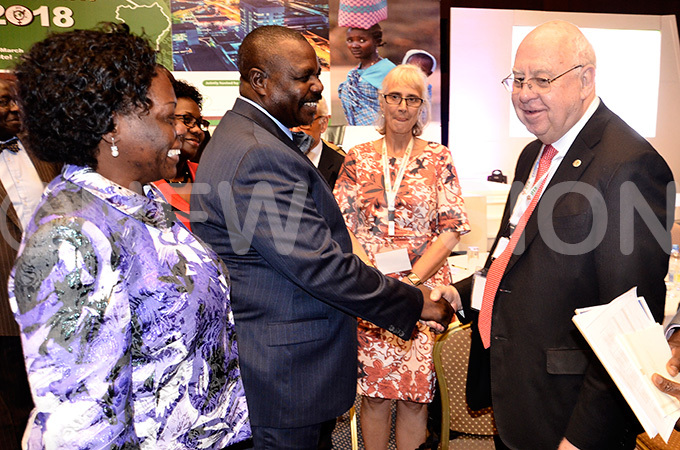Government to introduce fertility units in regional hospitals
Mar 02, 2018
The move is to relieve couples with infertility problems from over relying on private clinics which offer these services at a very high cost.

The Deputy Speaker of Parliament of Uganda, Jacob Oulanyah speaks during the opening ceremony of the International Federation of Fertility Society symposium at Serena Hotel Kampala on March 1, 2018. Photos by Ronnie Kijjambu
Government has revealed plans to soon introduce fertility treatment centres in different regional hospitals across the country.
The move is to relieve couples with infertility problems from over relying on private clinics which offer these services at a very high cost.
At the moment, there are only six clinics in Uganda offering infertility related health care services like Vitro Fertilization (IVF), which are all private, based in Kampala and very expensive.
The IVF is a process that increases the efficiency of human reproduction, which is often not very efficient naturally.
The revelation was contained in President Museveni's speech which was read for him by the deputy speaker of Parliament, Jacob Oulanyah during the opening of the first ever international infertility symposium in Africa, which was held at Serena hotel in Kampala on Thursday.
"We are going to extend fertility treatment units in regional hospitals across the country so that couples in Uganda suffering with infertility problems do not have to rely on private ones which are very expensive," read the speech.
 The state minister for health for general duties, Sarah Opendi (left) interacts with Deputy Speaker of Parliament, Jacob Oulanyah (center) and the Founding Chair of Florida International University, Prof. Joe Leigh Simpson (right) during the symposium
The state minister for health for general duties, Sarah Opendi (left) interacts with Deputy Speaker of Parliament, Jacob Oulanyah (center) and the Founding Chair of Florida International University, Prof. Joe Leigh Simpson (right) during the symposium
The president in his speech also noted that the Public and Private Partnership (PPP) arrangement and introduction of health insurance will lead to reduction of fees charged by private clinics in accessing fertility services.
The President called upon specialists in this area to sensitize the public about the causes of infertility among both men and women.
The conference was hosted by the International Federation of Fertility Societies (IFFS) in close partnership with the ministry of health and Uganda Fertility Society.
It was under the theme: "Infertility awareness, access, capacity building and management in sub-Saharan Africa for happy families."
Addressing journalists recently, state minister of health for general duties, Sarah Opendi revealed that fertility services in Uganda are still very expensive, and one has to pay between sh10m-20m to access infertility related services in private health facilities.
She also revealed that either in March or beginning of April, Mulago women's fertility hospital will start operations, and discussions are ongoing whether the services should be free or cost-shared with the patients at this facility.
According to statistics, about 10-15% of the couples in Uganda cannot have children due to infertility.
About 75% of these are due to sexually transmitted infections (STIs), which lead to blockage of fallopian tubes in women and sperm ducts among men.
Some of the causes among men include; problems with the delivery of sperm due to sexual problems such as premature ejaculation, structural problems as blockage in the testicles, damage or injury to reproductive organs, over exposure to certain environmental factors such as alcohol consumption, smoking, radiation among others.
While in women infertility can be caused by ovulation disorders, sexually transmitted infections (STIs) especially if not well treated, damage of the fallopian tube or blockage often caused by inflammation of the fallopian tube, cancer and its treatment among others.
